Last updated: 13 June 2022

You know what they say: leaders are made, not born.
If that is the case, what does it take to “make” a leader?
Ask most leadership experts and they’ll probably tell you the same thing: the best leaders all share a certain number of essential leadership competencies.
They’re the skills and abilities that great leaders display, day after day.
The qualities and characteristics that set top leaders apart and put them on a whole different level.
And if you’ve ever worked in a large organization or initiative, you’ll know that one thing is always apparent.
Those organizations and initiatives that perform well do so because they have strong, consistent leadership.
Whether it’s a school or college, an office or health department, it’s the leaders that set the tone and drive the whole thing forward.
Just as poor leadership has the potential to cause chaos, frustration and ultimate disaster.
That’s no big surprise, is it? Leaders are supposed to be able to lead their teams effectively.
They’re supposed to be able to get results and increase productivity.
And whatever challenges might come along, they’re supposed to be able to deal with them in an appropriate and timely manner.
That’s why they’re leaders, because it’s their job to lead.
They’re supposed to have many of those skills and abilities referred to above.
But what skills and abilities – in other words, what leadership competencies – should leaders strive to attain?
Before exploring some of those, perhaps it makes sense at this point to get a better understanding of what is meant by “competencies”.
Essential Leadership Competencies Defined
If you look up competencies in a dictionary, you’ll find a definition something like this:
The skills or abilities necessary to perform a task to an acceptable standard in an efficient and proficient manner.
That makes sense, but there’s more to it. A competent leader needs to have the experience and expertise to act in any given situation.
To be truly competent, however, that same leader would need to be able to interpret the situation and act appropriately, rather than simply repeating the same actions from one situation to the next.
On top of that, the best leaders will be able to learn and adapt so that their specific competencies are improving with time and experience.
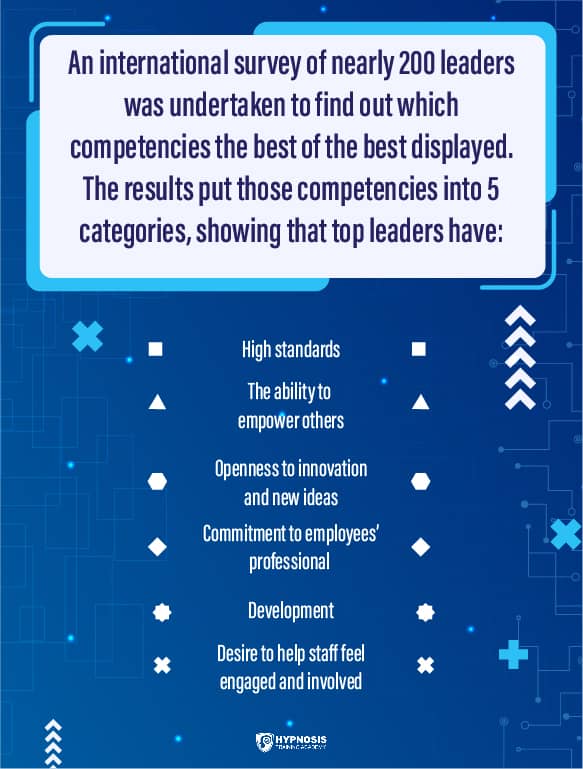
Many leadership experts tend to break down the leadership competencies into 3 subsets. These include competencies for leading the organization, for leading others, and for leading oneself.
For the purposes of this blog post it makes sense to focus on the competencies required for leading others, since that is a major part of every leader’s responsibility.
There are certain characteristics that all leaders should either possess or be keen to acquire. They include the following:
- Able to communicate the company’s vision and strategy
- Able to motivate and inspire their teams
- Able to keep staff morale high
- Able to engage employees to meet production targets
- Able to provide adequate working conditions and suitable resources
These are some of the more general traits you might automatically assume a leader has. When it comes to leading others, however, the best leadership skills can be narrowed down even further.
The Top 5 Essential Leadership Competencies For Leading Others
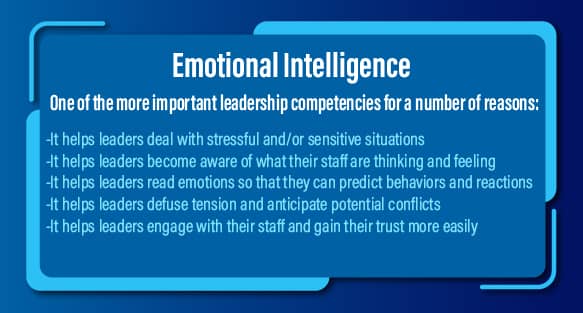
1. Emotional Intelligence
Also known as EI, this refers to being able to understand emotions in other people as well as how emotions can affect and impact various situations. EI is often said to be one of the more important soft skills or people skills, and a good leader should also be aware of their own emotions and the role of their emotions in everyday activities.
Emotional intelligence is one of the more important leadership competencies for a number of reasons:
- It helps leaders deal with stressful and/or sensitive situations
- It helps leaders become aware of what their staff are thinking and feeling
- It helps leaders read emotions so that they can predict behaviors and reactions
- It helps leaders defuse tension and anticipate potential conflicts
- It helps leaders engage with their staff and gain their trust more easily
There’s been an increased emphasis on mental health in the workplace as a result of the global pandemic. Emotionally intelligent leaders now realize the necessity of checking in with their employees, whether they’re remote or in-person workers. To make sure they’re able to do their job successfully, leaders should ensure their instructions are clear and unambiguous, that their staff workload is realistic and achievable, and that the requirements of the job are not placing an unnecessary burden on team members’ mental health.
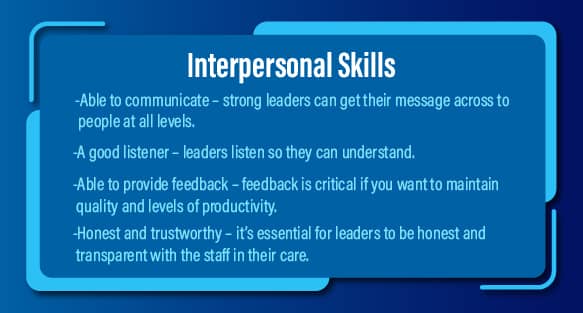
2. Interpersonal Skills
As the name implies, this refers to relationships between people. Another of the so-called people skills, this competency can be broken down into a number of core characteristics such as:
1. Able to communicate – strong leaders can get their message across to people at all levels, from the CEO all the way down to the staff on the factory floor. They say what they mean using specific language that can’t be misinterpreted. They’re also very good at making their expectations known in as clear and simple a way as possible.
2. A good listener – leaders listen so they can understand. They need to be able to take in both sides of an argument and to ensure that every voice gets heard. It’s important that each member of staff feels that their views are being listened to, as this helps keep them engaged and productive.
3. Able to provide feedback – feedback is critical if you want to maintain quality and levels of productivity. Constructive criticism is valuable, but this should always be tempered with positive feedback. Great leaders know the importance of praising staff for what they’re doing well and pointing out the things they could be doing better.
4. Honest and trustworthy – it’s essential for leaders to be honest and transparent with the staff in their care. When they know you’ll always be frank and candid, they’ll realize they can trust what you say. It’s also a good idea to show your trust in your employees by letting them take the reins and not micro-managing them.
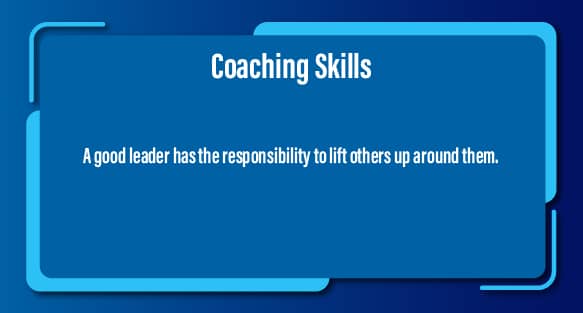
3. Coaching Skills
A good leader has the responsibility to lift others up around them. Part of their role is to be able to bring out the best in their staff members, to give them the opportunity to perform at their peak and reach their full potential as often as possible. They can do this by empowering their employees, guiding them towards solutions rather than showing them, encouraging them to succeed, and giving them the constant motivation they need to do well.
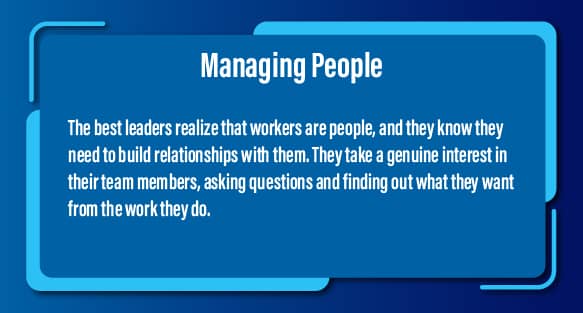
4. Managing People
One of a leader’s main overall responsibilities is being able to build a strong and flexible team who can help bring the organization’s goals to fruition. They do that by guiding, motivating and encouraging their employees to do their best. Whenever necessary, they make sure their staff get the training they need to do their jobs well and to ensure their professional development isn’t overlooked.
The best leaders realize that workers are people, and they know they need to build relationships with them. They take a genuine interest in their team members, asking questions and finding out what they want from the work they do.
Likewise, great leaders lead by example. Instead of telling staff how they should behave, they show them. If a leader asks their staff to work extra hours, or take a cut in pay, then they should be willing to do the same thing. This demonstrates that everybody’s in it together and that they’re all working towards the same goals.
Naturally, leaders need to be compassionate and able to empathize with their workers. It’s important to support your staff through the good times and the bad, making allowances as necessary for when things go wrong and life gets in the way.
And since no two business days are likely to be exactly the same, strong leaders also need to be flexible, adapting and changing as circumstances dictate. It also helps if you can expect the unexpected and be ready for anything.
>> Related Article: What Is Employee Experience (EX) And Why Is It Becoming A Management Trend
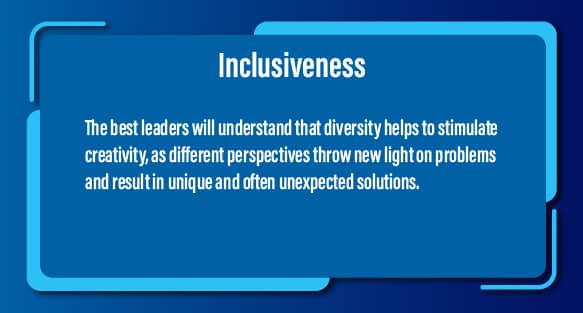
5. Inclusiveness
A good leader should be willing to embrace the differences and variety that each member of the team brings to the table.
Workers will come from diverse backgrounds with various experiences, skills and expertise, and it’s important to make sure that each one feels they are making a valuable contribution to the organization.
The best leaders will understand that diversity helps to stimulate creativity, as different perspectives throw new light on problems and result in unique and often unexpected solutions. This kind of inclusive culture frequently leads to the development of new products and better ways of working.
>>Related Article: What is Inclusive Leadership?: What it Means Today
How To Improve Leadership Skills
If you feel that your leadership competencies are lacking in any way, what can you do about it? Business guru Tony Robbins highlights 8 essential skills you should already have or should work towards acquiring. Here they are in brief:
-
- 1. Devise A Game Plan – take note of any weaknesses and search out the training or study time you need.
- 2. Get Passionate – inspire and motivate your staff by making an effort and by not giving up until you find workable solutions.
- 3. Be A Role Model – show your staff and colleagues that you’re not afraid to get your hands dirty and they’ll respect you and be inspired by you.
- 4. Focus On Your Strengths – take note of your weaknesses but also put your strengths to good use while you develop any lacking areas.
- 5. Set Achievable Goals – set short-, medium- and long-term goals that are achievable and that will propel your business forward.
Learn From Your Mistakes – admit your mistakes and use them to ensure the same problems don’t arise in the future.
- 6. Be Inspirational – show others that you believe in yourself, in them and in the company so that they will be inspired to do their best and keep things ticking over.
- 7. Know Your True Purpose – stay focused and motivated on why you do your job in order to successfully achieve whatever goals you set yourself.
Where To Access Leadership Training & Resources
The very best leaders should have most of the skills and competencies mentioned above. But what if you don’t? Where can you get help acquiring them?
You’ll find lots of help and advice online by browsing to respected sources such as the Harvard Business Review, Forbes and Business Insider. You could also subscribe to a specialist leadership website such as Inspiring Leadership Now.
There’s no such thing as too much training or too many resources. The most successful leaders don’t just rest on their laurels. They’re constantly learning and striving to be the best leaders they can be, doing whatever it takes to provide a conducive atmosphere that allows their staff teams to flourish and prosper.
They do these things because they know that when their employees are happy, they’re more productive, and as a result the business goes from strength to strength.
Conclusion & Key Takeaways
These days leaders need to possess a number of essential leadership competencies.
They’re the skills and abilities good leaders should have in order to do their job efficiently and successfully. All leaders should ideally already be able to:
- Communicate a clear vision and strategy
- Motivate and inspire their teams
- Keep staff morale high
- Keep staff engaged and productive
- Provide adequate working conditions and resources
In order to lead their staff teams and colleagues effectively, leaders should have a certain number of leadership competencies under their belts, including:
1. Emotional Intelligence – being able to understand emotions in other people and how they impact work situations.
2. Interpersonal Skills – being able to relate to other people by listening, providing feedback and being open and honest.
3. Coaching Skills – being able to guide and encourage staff in order to bring out the best in them.
4. Managing People – being able to build a strong and flexible team who can help bring the organization’s goals to fruition.
5. Inclusiveness – being able to embrace and make use of the differences and variety that each member of the team brings to the table.
There are a number of respectable online resources you might turn to if you feel any of these skills is lacking, such as Forbes & the Harvard Business Review. You could also subscribe to a specialist leadership site such as Inspiring Leadership Now.
At the end of the day, the very best leaders strive to keep their employees happy and engaged, because they know that this will result in increased productivity and a long and prosperous future for their business.

